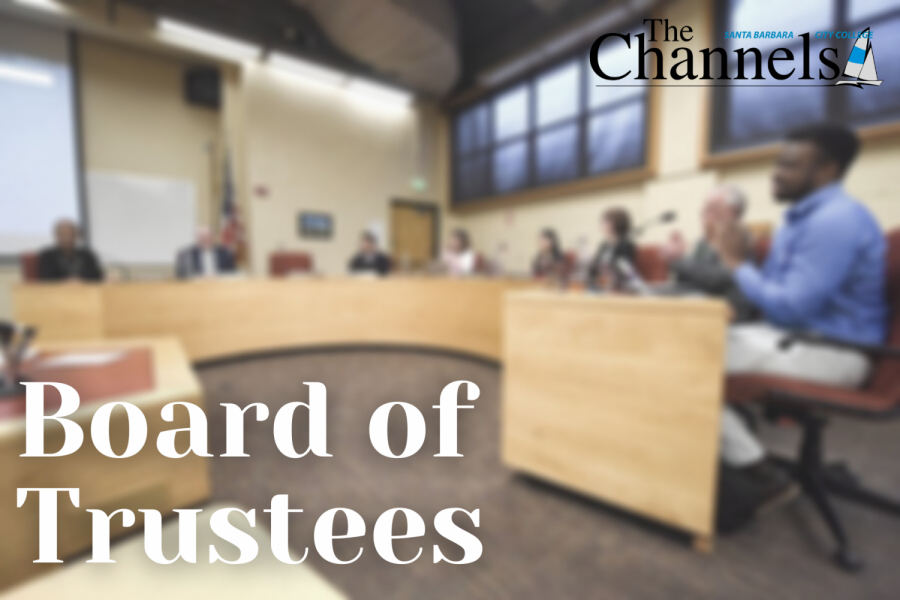The semester commenced with a tense stand-off during yesterday’s Board of Trustees meeting with Academic Senate President Raeanne Napoleon during a presentation for the senate’s resolution on their vote of no-confidence against five of the seven members on the board.
In an eight-page Writ of Particulars, the senate provides evidence documenting the Board Policies that have been allegedly infringed by members of the Board of Trustees. The members in question include trustees Marsha Croninger, Veronica Gallardo, Peter Haslund, Robert Miller and Kate Parker.
“The Writ of Particulars documents the different times that the faculty body, the senate in particular, felt as though the board as a whole, or as individual board members in their official capacity as a trustee, were not representative of the faculty voice, the student voice and the campus voice,” Napoleon said.
During a special Academic Senate meeting on Aug. 3, members went ahead with a 13-2 vote of no-confidence, which has no legal ramifications but states the senate’s lack of confidence in the five board members to lead.
Trustees Jonathan Abboud and Anna Everett, who supported the vaccine mandate during the board’s multiple summer discussions, were left out of the no-confidence vote.
Although Croninger was included in the vote of no-confidence, she has been in support of the mandate and worked with interim Superintendent-President Dr. Helen Benjamin on drafting the vaccine mandate resolution that was passed by the board on Aug. 5.
During last night’s comments, Miller interrogated Napoleon with a series of questions that resembled a prosecutor conducting a cross-examination. Miller singled out her comments in The Independent where she said, “We want an effective board that works for the campus community, not for the greater community.”
He explained that these comments are not helpful to the board’s efforts to acquire a bond measure they plan to present to the “greater community” next year.
Napoleon responded by saying, “I’m not sure that this level of questioning is helping build bridges as I understood was the intent of the board.”
Miller asked Napoleon if she understood that funding for the Promise Program came from “generous individuals in the greater community.”
“Yes,” Napoleon said. “I didn’t realize that you were a Board of Trustee member on the foundation, I thought that you were a Board of Trustee member for the district.”
Parker followed up the discussion by questioning the senate members’ understanding of the Brown Act. She pointed out that during yesterday’s senate meeting, and past summer meetings, the senate took actions on items that were listed as discussion when they were sent out on the agenda.
Croninger revealed that they sought a legal opinion on the senate’s motion of no-confidence.
“The legal opinion is that it was done in violation of the Brown Act and without legal authority,” said Croninger. “There is no authority in the ed code, there is no authority in Title V, there is no authority in your constitution, your bylaws.”
She said the senate violated the Brown Act by listing items in the agenda for discussion and not for decision, rendering the votes “void.”
Croninger called the senate’s actions “backward,” likening them to a defendant being convicted without due process. She said the senate should have talked collegially with the board first.
“It is not true at all that we weren’t collegial,” Napoleon said. “The faculty body has in many ways, and they are too countless to go into right now, have expressed concerns about this board many times.”
Napoleon also noted the “irony” of the board accusing the senate of being non-collegial while also having the district’s lawyers look into the legality of the senate’s motions without notice.
“I think it would have also been collegial to give a heads up to the Academic Senate President or other leaders of the Academic Senate that you all were looking into the legality of what we were doing as opposed to presenting that during a public forum,” Napoleon said.
Croninger continued by offering potential solutions—like starting a joint process for discussing the roles of each governing body or following due process with the vote of no-confidence.
“Why not have that dialogue rather than go back to ‘no we insist on voting again,’” Croninger said. “Because the point is the dialogue, the point is not, I hope, the vote.”
Napoleon said that the senate will revote in accordance with the Brown Act while clarifying that the vote of no-confidence was never intended to be a legal motion, but a political statement. She said she was disappointed in the comments.
“You were all focusing on technicalities and one statement made in the press, and not the substantive content for which we presented to you.”
Correction: Aug. 27, 2021
An earlier version of this story stated that Abboud and Everett were the only two trustees in support of the vaccine mandate. It has been corrected to reflect that Croninger also supported the mandate.














